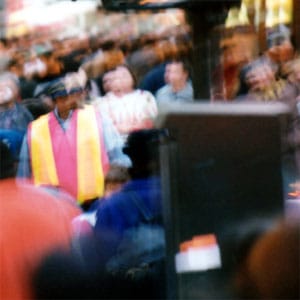
Upholding Justice
More than a million children are taken into captivity every year. Today on the broadcast, Gary Haugen tells listeners what one man can do to help uphold justice and free those held in slavery.
Show Notes
About the Host
About the Guest
-
More than a million children are taken into captivity every year. Today on the broadcast, Gary Haugen tells listeners what one man can do to help uphold justice and free those held in slavery.
-
Dave and Ann Wilson
Dave and Ann Wilson are hosts of FamilyLife Today®, FamilyLife’s nationally-syndicated radio program. Dave and Ann have been married for more than 38 years and have spent the last 33 teaching and mentoring couples and parents across the country. They have been featured speakers at FamilyLife’s Weekend to Remember® marriage getaway since 1993 and have also hosted their own marriage conferences across the country. Cofounders of Kensington Church—a national, multicampus church that hosts more than 14,000 visitors every weekend—the Wilsons are the creative force behind DVD teaching series Rock Your Marriage and The Survival Guide To Parenting, as well as authors of the recently released book Vertical Marriage (Zondervan, 2019). Dave is a graduate of the International School of Theology, where he received a Master of Divinity degree. A Ball State University Hall of Fame quarterback, Dave served the Detroit Lions as chaplain for 33 years. Ann attended the University of Kentucky. She has been active alongside Dave in ministry as a speaker, writer, small-group leader, and mentor to countless wives of professional athletes. The Wilsons live in the Detroit area. They have three grown sons, CJ, Austin, and Cody, three daughters-in-law, and a growing number of grandchildren.
-

Gary Haugen
Gary Haugen is the founder of and currently serves as President and CEO of International Justice Mission. Mr. Haugen received a B.A. in Social Studies, magna cum laude, from Harvard University, and a J.D. from the University of Chicago, cum laude, where he was the Ford Foundation Scholar in International Law. He also served as the Visiting Scholar in Politics at the University of Adelaide in Australia. Haugen was the Director of the U.N. investigation in the aftermath of the Rwandan genocide,...more
More than a million children are taken into captivity every year.
Bob: Do you ever find yourself thinking, with all of the starvation or all of the poverty, all of the orphans in the world, all the injustice, does it really do any good to reach out and try to help one child? Here is Gary Haugen.
Gary: You know, we hear these stories, and we even hear, "Oh, well, if some of those rescued," then we think, "Well, aren't there thousands more? And if we can't stop all of this and rescue them all, what's the point?" I think any one of those little girls understands the point, and whether it's that one little five-year-old Lahm [sp] – she not only understands that she is the point of such actions, but I think, for Jesus, she is the point.
Bob: This is FamilyLife Today for Thursday, November 27th, Thanksgiving Day here in the United States. I'm Bob Lepine, along with the president of FamilyLife, Dennis Rainey. What role can we play today to help bring justice to someone in our world who is being oppressed? We're going to talk about that today. Stay tuned.
And welcome to FamilyLife Today, thanks for joining us on the Thursday edition, on the Thanksgiving Day edition of our program. It may be that some of our listeners are wondering we are addressing a subject like this during the Thanksgiving season. But I think as we spend time thanking God for the blessings of liberty and for the blessings of abundance that we enjoy, we have to keep in mind that those blessings are not simply designed by God to provide for our own self-indulgence but to give us an opportunity to reach out to others and to care for others.
And we're going to hear a story today that some parents are going to want to make sure younger listeners are distracted when this story is told because it's disturbing and a troubled story and yet, Dennis, it's a real story of what's happening in part of our world that most of us have never seen.
Dennis: Bob, it's a story that has to be told because of the injustice, of children who are being oppressed through sex slavery and trading their bodies for cash and Gary Haugen is with us this week, and I appreciate you, Gary, and your leadership as founder and president of International Justice Mission, and I think the more we've talked, Bob, this week about what Gary and his team are doing, the more I respect your faith and the heart of God as you are representing it around the world.
We've been talking about your book, "Terrify No More," and that book is really written around the story of a community, a community in Cambodia about, what, six miles or so outside of Phnom Penh, is that right?
Gary: That's right. It's a little village called Svay Pak, and I first saw Svay Pak after a short ride on a motorcycle outside of Phnom Penh and just entered into a lot of familiar villages in the developing world – a lot of shacks but a single dirt-road main street. The thing that's a little different about this village is that on either side there was nothing but brothels. It looks like any other store front in the developing world, except it has iron bars at the front of it, and poking outside of those iron bars are scores of these young women and children who are offered on sale to provide sex to the customers.
So you walk down this street …
Dennis: You are actually walking by the young children who are the prostitutes?
Gary: Well, the youngest children are in the back rooms. So what you see if you just walk down the street are the girls who are maybe 15, 16, 17 – the older ones. These are the older ones, and they are put forward by the pimps to draw customers in, and if you enter into these – into the brothel, any one of us could just simply walk into this place. There is no fear of anybody being caught of something bad going on or something. You could walk in, and you would have presented to you just scores of these children who are being forced to provide sex to anyone who brought money.
Dennis: When you say children …
Gary: Yes?
Dennis: … how old?
Gary: Well, most of them are young teenagers, so they are 12, 13, 17 years old. But there are also scores of children between the ages of 5 and 10 years of age who, for a few dollars, I could rape, assault, sodomize – that's just what the customers come there to do to these kids, and they endure it day after day after day.
Dennis: Now, you mentioned customers – who is walking down the street? Who are the customers?
Gary: In this village, it's largely foreign pedophiles and sex tourists who come from all over the world to this village where they know that they can commit these horrific acts against children, and they can do it and get away with it.
And UNICEF tells us that there about 1 million children taken into forced prostitution new every year around the world. So while I was seeing scores of them in this one village, there are millions of others around the world.
Dennis: You know, I'm putting that number – 1 million new each year – up against some additional data that I just ran across where right now we're told that there are about 35 million to 50 million orphans worldwide. In the next five years, that number is going to double to over 105 million orphans.
And so the 1 million new children, that's going to double, that's going to triple because these orphans are not going to have anybody to protect them.
Gary: I think all you need to do is now turn to the Scripture and understand why. So frequently it speaks to the need to defend the orphan; for the need to show compassion and to raise a voice for the orphan. Why? Because not only are orphans threatened with the fact they may not be able to have food or a house, or they may not be able to have medical care – what they need most fundamentally is protection.
And one of the ways in which they are going to be preyed upon in a fallen world is they are going to be preyed upon sexually. And if this is permitted, if there is not a price paid for doing this to children, sexual assault and sexual abuse of children takes place at an epidemic rate around our world.
Bob: Gary, you were in Svay Pak, Cambodia, because someone had alerted you to what was happening there. You went there to see it firsthand. Once you saw what was going on, can you go to the authorities and say, "You've got to go arrest these people." I mean, certainly, people know what's happening here, and nobody is stopping it.
Gary: Well, this is the shocking thing that Americans need to understand – we had first heard about this problem in Cambodia because of rumors that reached our office in Northern Thailand about this open sex market when they were selling little kids. And so we sent some initial investigators out to see, and, sure enough, there it was.
And so what we needed to do was to be able to take that information to some authorities that would actually motivate an intervention, and so one of the things we were able to do is to involve the U.S. ambassador there. The American people, in the year 2000, had their Congress pass something called the "Trafficking Victims' Protection Act," which put the voice and values of the American people to stand with the victims of sex trafficking, and it basically says if you're not meeting minimum standards in protecting kids from sexual exploitation, there's going to be some negative consequences in your relationship with the U.S.
And so this was happening to Cambodia, and so the ambassador took this very detail information that we had provided to the Cambodian authorities, who had already slipped down to the lowest tier of grading in terms of their dealing with sex trafficking and said, "If you want to get off this bottom tier, and if you don't want to risk these consequences with the U.S., you must take action against Svay Pak and work with IJM to do something about this."
And so what we were able to do then was to be able to set up a secure relationship with the Cambodian police, a special unit that had been set aside for these purposes – able to then corral a lot of the children in a central place. It had taken a lot of work and, actually, there was a ruse by which we were setting up what the people in Svay Pak thought was a sex party to which all these Westerners were coming, and so they were to bring all the children who were being sold to this one place so that we could raid it. And just as this was about to go down, and all the dangers and tensions of that, which we poured into preparations for months and months, this was the moment when this was either going to work or not, and the only way you can really go into such a moment, I think, is to ask the God of justice to go with you.
Bob: And there was, Gary, undoubtedly, some tension in that room. I mean, hearts were beating fast. You were walking into danger, and if God didn't go with you …
Dennis: Yeah, I mean, it's like a battle.
Bob: "Lord, don't let us go up from here unless You go with us."
Dennis: Exactly.
Bob: That was the cry of the Israelites in the Old Testament, and you must have been praying the same kind of thing.
Gary: There was tremendous tension, I think not only because of the specific threats that applied to our operatives in the region but also tremendous tension over these children whose faces we knew, whose names we knew. We knew what was being done to them, and this was the moment where we would see whether or not we would be able to rescue them. Because once you make the attempt, and it doesn't work, the chances of those kids still being around is very, very small.
Dennis: Gary, introduce us to two of those children that you rescued.
Gary: One of them, in particular, I'll never forget in my entire life, because she appeared in one of the first undercover investigations that we did in Svay Pak, because on the film, on the grainy, dark, undercover video, you can see a series of children being presented to our investigator, and they keep getting younger and younger, because it seems the pimp is trying to find what it is the investigator wants in terms of a child.
And so first he is presented with 11 and 12-year-olds; then there is an 8 and 9-year-old; and then the next thing you see is there is a small child picked up in another girl's arms and presented, and she is only five years old, and came to know her name, and Lahm was then one of these girls that we knew from these videos. We knew what was being done to girls like Lahm, and so would Lahm be there on the day when we had asked all the pimps to bring the kids together so that we could have them in one place where we could, in a sense, get our arms around them in a good police rescue.
And so the sense of tension – I had a list in my pocket of each one of these kids' names, their picture next to it, and every day there in Cambodia, I would be praying, "Oh, God, bring these children." And this is part of, also, what you open yourself up to when you do the work of justice. It puts your faith on the line. It says to God, "God, you are the God of justice, You say this in Your Word, and here are these children suffering in these ways and, Lord, we are going to step out now to try to bring the love and compassion and justice that You have called us to. But, Lord, if you don't show up there with us, we're going to get squashed like a bug." And you open your heart up to a form of suffering.
Bob: So did you have, I don't know, buses, squad cars, a policeman that came into Svay Pak and surrounded the city?
Gary: We did. We had several busloads of police officers staged for the raid, and one of the most powerful things that happened after the sweep was that we were able to actually have a number of the key perpetrators arrested. We were then actually able to see that they were properly prosecuted and convicted, and that sent a tremendous signal throughout not only the little town of Svay Pak but then throughout all of Phnom Penh that there will be a price to be paid for peddling these kinds of children.
And so now Svay Pak, that place that was a bustling little village of the most disgusting child sex slavery, is now those brothels are boarded up, and we've seen the Cambodian authorities really turn a corner on protecting these most vulnerable children.
Bob: So the work is continuing. There are additional raids going on and …
Gary: Correct. We have an office in Cambodia now, and every day IJM is out there doing investigations, doing interventions to rescue kids, working with after-care providers, and now we are training the Cambodian police to do this themselves, and we have seen the Cambodian police respond very well. And so now they're equipped to protect their own children.
Dennis: Gary, just listening to you describe that, it has to be tremendously gratifying to rescue just one, just one little girl.
Gary: Right, I …
Dennis: I mean, you have four children.
Gary: I do, and this is, I think, one of the things that frequently paralyzes us. You know, we hear these stories, and we even hear, "Oh, well, some of those were rescued," and we think, "Well, aren't there thousands more? And if we can't stop all of this and rescue them all, what's the point?"
But, you know, I think any one of those little girls understands the point, and whether it's that one little five-year-old Lahm, she not only understands that she is the point of such actions, but I think, for Jesus, she is the point.
And, for me, to be able to see the God of justice use us to do these miracles, I don't really need more. It's – to have rescued the one, to have rescued whatever the number is, is so gratifying and brings a joy that I wouldn't trade for anything. You couldn't pay me more money, you couldn't give me another job. The joy of being able to bring a child out of that circumstance is indescribable. But it only comes, in a sense, from stepping out into that very risky territory where you don't have enough power yourself to engage it, where you have to get down on your knees before the God of justice and say, "Okay, God, you said this about yourself. You said we should go do this, and You promised You'd go with us, so here we go now. Show up, O God of justice."
But the thing is, you actually get to see the God of justice show up, and there is, at least in my experience, there is nothing more powerful or nothing that resonates more deeply with why we even exist and to actually do something with the very God who made us.
Bob: Before the raid occurred, you had a list of reasons why it didn't makes sense to go through with the raid. You'd kind of noted down all of the reasons why this didn't make any sense, and then what did you do with the list?
Gary: Sure – well, this is one of the things that's kind of funny, in a way, because people think, "Well, we must just be dreamy-eyed idealists going out into the world taking on this kind of work." But, actually, professionally, what I'm actually good at is identifying what's completely impossible about all this.
[laughter]
Dennis: Well, I think most Christians are good at that, you know?
Gary: I'm a lawyer and a strategic person on law enforcement matters, and so what I can do is pick apart these situations and tell you eight reasons – at least eight reasons – why this is completely absurd. And I can tick them all off on my hand but then, at the end of the day, after you have all those things, what you still have in your mind is these children. And so what you then have to do is simply go to God for the parts that are impossible.
We apply technical training, we apply expertise, we've got some of the best lawyers in the world but, at the end of the day, the God of justice must act.
Bob: And you saw 37 young girls liberated. What you didn't see but you know has happened is that, as perpetrators wound up in jail, other brothels either shut down out of fear or never sprang up in the first place. So those 37 represent hundreds of other girls who either got set free because their captors no longer wanted to take the risk, or they were never imprisoned in the first place because, all of a sudden, sex trafficking became a high-risk occupation in Cambodia, thanks to the raid on Svay Pak.
Gary: Well, this is part of the magic of it, because some of the – like, one of the worst perpetrators, she was sent away for 20 years. Well, she used to traffic scores of children every year. So what you also have to picture is the scores of children every year who are not being trafficked because she now is property in jail, and you also need to think about her neighbors in the business who, all of a sudden, decided, "Whoa, let's not do this anymore, because we don't want to sit in the jail cell like her."
There is a tremendous and powerful ripple effect of the work of justice, which I don't think we've even begun to conceive of. And you can see how this isn't sort of the first thing we sign up for in terms of Christian ministry. But there is no lack of calling in the Scripture. Micah, chapter 6, verse 8, says, "I have told you, O Man, what is good and what the Lord requires of you but to do justice, to love mercy, and to walk humbly with your God."
And Joe Stowe [sp] was actually speaking to the executive leaders of the mission agencies, I remember, and he was describing this passage by saying, "Isn't it great that our Heavenly Father tells us what He expects of us. He doesn't keep it hidden, like we don't know, and He also gives us these nice, short lists of things, not long lists that we couldn't keep track of, but short lists," and then he pointed us to this passage from Micah, chapter 6, verse 8, where he gives this short list of "do justice, love mercy, and walk humbly with your God."
And he said, "What are doing about the first thing on God's short list of three? And when Jesus confronted the Pharisees in Matthew 23, verse 23, he says, "You've neglected the weightier matters of the law. And what are they? The short list of three again – justice, mercy, and faith. And so what stepping out into this calling of justice has meant, though, is going out beyond what it is safe to do.
And I wish the spiritual equation of intimacy with God was different than it is, but it seems to be, "I will be there closest to you when you really need me." And in the work of justice, you really need God. But then you get to actually see Him.
Dennis: Yeah, and again, if you've never seen Him, man, where is your faith? Step out. Find a way to step into the lives of the oppressed and just engage in their pain and help them.
Bob: Our listeners hear a story like this, Dennis, and they may think, "Man, that's a powerful story, and I'm sure glad that Gary and his organization are doing that. That's a great noble – I'm glad" …
Dennis: "Good for them."
Bob: Yeah, "Good for them," and they reach over to turn off the radio and say, "Now, I've got to get back to my thing." But Micah 6:8 wasn't just written for Gary and his organization. All of us have to ask the question, "What's our role in justice?" And I think, as we ask ourselves that question, a lot of us go, "I don't know what the answer – I don't know how to answer that."
And I think Gary's addressed that in the book that he's written, which is called "Terrify No More." It talks about what International Justice Mission is doing, but it also talks about what individuals can do and how we can not only support your work, but how we can have a heart and a mind that keeps the needs of the oppressed in front of us, that take seriously this issue of setting captives free. And that has to be done both spiritually and physically. We're not saying that the liberation of slaves is the ultimate end of the Gospel. There are some who would go in that direction, but we are saying that spiritual liberation and the actual human liberation go hand-in-hand, and I think you're demonstrating that through the work of IJM.
I want to encourage listeners to get a copy of the book, "Terrify No More." We've got it in our FamilyLife Resource Center. You can go to our website, even today, even though it's a holiday, just go to FamilyLife.com. On the right side of the home page, you see a box that says "Today's Broadcast." If you click where it says "Learn More," up will pop an area of the site where you will get more information about Gary's book. There is a link to his website, additional resources are available from us. Again, you'll find more on our website at FamilyLife.com.
You can also call us, but you'll want to wait until tomorrow to call because of the holiday. When you do get in touch with us, the number is 1-800-F-as-in-family, L-as-in-life, and then the word TODAY, and we hope to hear from you. I hope you'll get a copy of this book and read it and talk about what you can do as a family, what you can do in your church, how you can cultivate a heart for the oppressed and a heart for freedom and for justice.
You stop and think about this particular day in human history and what it is we celebrate on Thanksgiving, it's the blessings that we enjoy in this country at God's hand. We are thanking Him for His blessings on us, and we are grateful that liberty and prosperity are a part of those blessings, and I think it's helpful to remember on this day, particularly, that there are people all around the world who don't enjoy those blessings and to have our hearts tenderized on this subject.
So, Gary, we appreciate you being with us today. Tomorrow we're going to come back and talk more about what we can do to better understand the needs of the oppressed around the world. Gary Haugen will be with us tomorrow. I hope you can be with us as well.
I want to thank our engineer today, Keith Lynch, and our entire broadcast production team, in fact, on Thanksgiving Day I want to thank Phil Krause [sp] and Pete Stokey [sp] and Dennis Leek [sp]. They do a lot of work behind the scenes. I also want to thank Tonda Nations, [sp] our researcher, and Emmett Fowler [sp] and Michael DeLon [sp] and I'm going to leave somebody out if I start naming all these names. So, Megan and Heather, we want to thank them as well, and Kristi, and, I guess we ought to go ahead and thank Justin and Aaron and, do we thank Hugh and Julie? Okay, Hugh and Julie, thank you, and Michelle, and if I've left somebody out, I'm in real trouble. Well, I hope they'll forgive me. We do want to thank our entire broadcast production team. On behalf of our host, Dennis Rainey, I'm Bob Lepine. I'm just wondering, who did I leave out? Have a Happy Thanksgiving, and we'll see you back tomorrow for another edition of FamilyLife Today. Oh, that's it, I left out Matt.
FamilyLife Today is a production of FamilyLife of Little Rock, Arkansas – help for today; hope for tomorrow.
________________________________________________________________
We are so happy to provide these transcripts for you. However, there is a cost to transcribe, create, and produce them for our website. If you've benefited from the broadcast transcripts, would you consider donating today to help defray the costs?
Copyright © FamilyLife. All rights reserved.
www.FamilyLife.com





